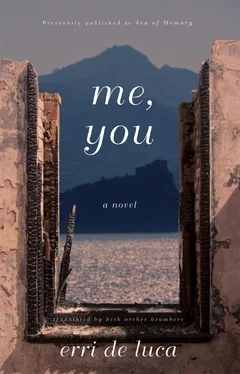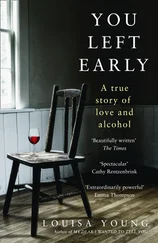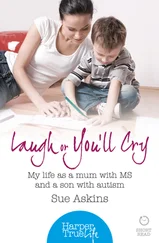“My mother, your grandmother, Ruby Hammond of Birmingham, Alabama, gave me a taste for freedom, for individual worth, for making one’s own way in the world. I could not have been born into a less fitting period. All those uniforms, rallies, party memberships were bad jokes repeated all day long. I stayed out of it as long as I could by going to France and Switzerland. My mother had taught all of us her English and the French of a proper upbringing. At that time it was rare, and a major advantage.”
Even in Paris fascism nettled him. An agent tried to enlist him as an informer because he frequented Italian circles. Disgusted, he left Paris and transferred his business to Switzerland.
Then the war broke out, he was called up, he proffered excuses, delays, and finally had to put on the hated uniform.
“I saw no enemies and I shot no one. I know that’s not enough for you, but it is for me.”
Uncle had managed to remain detached from his time, to treat it with pure contempt, not for political reasons, but because of a natural, physical aversion. He had also managed to avoid suffering from isolation, an ill that befalls those who despise their own times. It was impossible to use him as a model. His was an elegance of mixed blood that glows for only one generation. We, the sons, grandsons of that grandmother, carried only vague traces of that successful crossing of an American and a Neapolitan.

Uncle shunned the reigning conformity of his contemporaries because of his very nature. He sabotaged fascism where it was most sensitive and most pathetic — in its virility — by bedding the wives and mistresses of officials, even famous ones. These things he did not tell me, they were known, handed down. I asked him if he had ever had enemies. There was someone who held him a grudge, the usual stories of adultery, he said, someone who wanted to shoot him, and he remembered an agitated scene in a hotel, right out of an operetta, with a friend of his who flung herself into the bed, taking the place of the other woman, minutes before the woman’s lover burst into the room. Personally, he never considered anyone an enemy. He had, however, hated his uncle, who, on the premature death of his father, had taken over the business and had humiliated him, forcing him to leave. He had really hated him. He was young then and he was right to feel that way. Later he did not experience hostility.
“Not even toward the Germans?”
Not even them. Yes, he knew about the war and thought they had deserved a divided Germany and the Nuremberg trials. But he was one of the few soldiers in that war who had not known them. And so he couldn’t feel hostile. Such feelings had to be awakened by personal experience, not history.
“To hate for political reasons, to hate in the abstract, is something I don’t understand, something I don’t know how to imagine.” He spoke calmly as we wended through the island’s alleys, avoiding puddles. For once we wore shoes because of the rain. Our feet were encased for the first time after weeks of going unshod and they clamored for air, earth, and sea.
“May I ask why the war interests you so much?”
I had no short, easy answers like the ones he gave. I only said, “Because it’s your history, the only one we can learn from voices rather than from books.” I could have added that it was the only one I could challenge, because there were still witnesses, victims who had survived, murderers in good health. And they could be found under the clothing of the tourists who came to bare themselves to the sun, and under the name of a foreign girl you could easily fall in love with, but none of the grown-ups taught you how to recognize those tourists, how to know what world you were in. I had to keep asking people who no longer wanted to give answers, and all the while history was sweeping away the dust along with the ashes of the cremated, forests grew over mass graves, all of life forged ahead, hiding what lay behind. And I was as stubborn as a mule but without reason, for mules rebel when the load is too heavy, whereas I had no load at all. If I had no reason, why then was I so stubborn? Because of love, no doubt, but also because of a snarl of torment and a touch of incipient rage — the froth of my rapid growth during that summer.

Uncle told me that enemies were bothersome, they required too much attention and emotion. Let someone else make the effort of being your enemy, of expelling the hatred in his body. And he squatted like someone sitting on a toilet, in part as a joke, because he liked to laugh and make fun of the silly, stupid things people do when they’re being serious.
“You’re too young to have enemies. How old are you, sixteen? You should find yourself a girlfriend. Daniele tells me that you hang around with his friends, but those girls don’t give a hoot about you. They go for the older ones. You’d be better off going around with boys and girls your own age before the summer ends.”
He was once again talking to a boy from the distance of an adult. I couldn’t make him resume his previous manner, yet I had a tremendous urge to talk to him about Caia, ask him about her.
We had reached the gate where he was staying, a cool little cottage. For him the summer was a complete separation from his family. His work took him all over Naples, but when it came to vacations, he devoted his time entirely to himself. His wife was in the mountains with their other sons. Daniele, who preferred the sea, stayed with us. If I had talked to him about Caia, about a girl, he would have remained with me longer, he would have talked to me from his experience, would have taken me seriously, because he took love seriously. He would certainly have told Daniele later on. I had to forgo talking to the one person who could have clarified my thoughts and explained what was happening to me. He looked up at the north wind that tore away the clouds, revealing blue between the gaps, and said as he left, “See you tomorrow when we go fishing.” And he extended his hand to shake mine, a significant gesture he had never made before. I was changing in his eyes too, but I didn’t know how, except for that cockeyed one-sided love of mine.

It would suddenly happen that my voice dropped, and soon after changed back. It would happen that my hands fell into a new position, folded under my armpits like someone trying to warm up. It would happen that I rubbed my nose with the back of my thumb even though it didn’t itch. I would absentmindedly make strange, pointless movements. I had the impression of hearing Caia’s voice from far away, but she wasn’t speaking Italian and yet I thought I understood her. Was I losing my mind? If that was the case, it wasn’t so bad; on the contrary, it induced a kind of generalized love, not a desire for Caia’s body, but merely to be near her, offer her my help, encourage her, cheer her up. I felt growing in me a maturity that gave rise to such thoughts as: You can count on me, I won’t abandon you.
What could I possibly do for her, what kind of crazy ideas were taking shape in my head? The more I resisted them, the bolder and stronger they became. I felt the weight of many years. An intense feeling of shared intimacy kept my thoughts focused on Caia. I found myself moving more slowly. In her presence my breathing was even; away from her it was agitated. I would clasp my knees the way Uncle did and would stare at the design left by the moray’s teeth. It was a tattoo, an indecipherable red letter.
I was changing for her. Caia was turning me into someone else and it wasn’t just love that was involved. When I said to myself, “Chaiele, Chaiele,” the tenderness of a father welled up in me, a father who had a little girl to bring up, to put to bed, leaving on the hallway light.
Читать дальше













